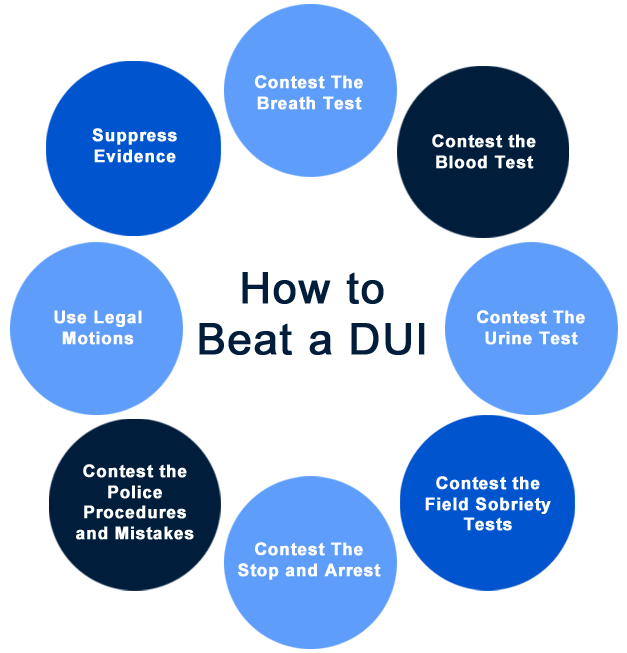
How To Beat and Defend a DUI in Georgia
Because the state of Georgia takes driving under the influence so seriously, it has defined DUI in several different ways, leading to two general categories in which you can be charged. The first is called DUI per se. Much like DUI charges in other states, DUI per se is when a blood or breath test shows a Blood Alcohol Content (BAC) of the legal limit of .08 or higher. However, Georgia also allows the police to charge you with DUI Less Safe. This charge generally comes if you believe you are too impaired to drive even if you blow below the legal limit. DUI less is also used often by police if there is any type of refusal to adhere to the tests asked by the police officer.
In addition to the criminal charge of either DUI per se or DUI less safe, you will more than likely also have a charge against your driver’s license. Beating all of these charges requires a multi-pronged approach, and an attorney who knows how to fight them. Experience is everything when it comes to fighting DUI charges in the state of Georgia, and you need an attorney with the expertise and experience to win your case.

Always Appeal Your Driver’s License Suspension
The most important first step you can take after being charged with DUI is to appeal the suspension of your driver’s license. Contesting the DUI criminal charges comes next but appealing the suspension of your license should come first, because there is a 30-day deadline after your arrest. Known as the “30 Day Rule,” this statute of Georgia law requires you to deliver a written appeal letter within that window in order to even begin fighting the charges against you.
The process of Administrative License Suspension (ALS) begins at the moment of arrest, when the officer fills out a Georgia Department of Driver Services (DDS) form 1205 stating that you were tested and found to have a BAC higher than .08. As soon as that form is filled out, the clock is ticking. In exactly 30 days, your license will be automatically suspended. It also applies if you refused the state administered breath test.
It’s vital that you submit a letter within that 30-day window to get a suspension hearing. At this hearing, your attorneys will get to work fighting your suspension, questioning whether there was probable cause, collecting evidence that we can use to support your case and even questioning the arresting officer under oath. The ultimate goal is to return your ability to drive and see what the prosecution and police have as evidence against you.
DUI Is Big Business and Big Money for Georgia
On paper, DUI laws exist to keep the roads safe and prevent accidents. In practice, DUI is extremely lucrative for the state. In Georgia alone, revenue from DUI fines and fees pumps millions of dollars into the coffers of local and state treasuries. Because of this, there is a huge incentive for police officers to charge you with DUI even if you are not impaired.
Because ultimately, DUI laws should exist solely to preserve public safety. Having one or two drinks and then driving home does nothing to endanger anyone unless you are impaired after those few drinks. Blinded by the revenue it brings into the state, police have shown a tendency to issue DUI charges to drivers who are safely operating a vehicle.
And you might think that just because you took a breathalyzer test and demonstrated you were below the .08 threshold, you are clear. But DUI less safe laws mean an officer has a tremendous amount of leeway in determining your ability to drive, and they can claim anything from marijuana to prescription drugs qualify you for charges that will put money in the bank. That’s why it’s crucial that you hire a defense attorney who knows DUI laws backwards and forwards – how to protect your rights and fight unfair charges.


We Are Only Interested in a DUI Dismissal or Reduction
Anyone can plead guilty to a DUI charge. You certainly don’t need an attorney’s help in throwing yourself at the mercy of the court. That’s why we don’t plead guilty, nor would we ever take a case to plead someone guilty and take their money. Instead, we fight to clear your charges or reduce them. And we have a winning track record to prove our worth. So, the obvious question at this point is how do we do it? And the answer is simple. We prepare ourselves like no other firm can, making sure that your charges are reduced or dismissed outright. Your arresting officer comes prepared to defend their record. The prosecution comes prepared to punish you and keep the revenue stream of DUI fees flowing. But we go deeper, scouring your case for every missed detail that can prove your innocence.
That difference in preparation not only sets us apart from other firms, it gives us a tremendous edge over the arresting officer in court. Frankly, the training that most officers receive is substandard, and often designed to simply secure the initial charges. They are trained to make assumptions, for example that your slurred speech isn’t just the way that you talk normally. They will assume that your natural pigmentation is a flushed face, or that your eyes are bloodshot without knowing you suffer from allergies. These are all fictional examples, but they illustrate the massive assumptions arresting officers make, knowing that most people won’t fight DUI charges. And even the more concrete evidence they’ll use against you can be easily picked apart.
Field Sobriety Tests Are Not Scientifically Accurate
There are a variety of tools that law enforcement will use to determine your ability to drive, and each has a fatal flaw. Digging into the cracks in the case against you is often just a matter of looking closer at these tests and demonstrating their ineffectiveness. Take for example the Field Sobriety Test (FST) that you were most likely put through at the time of your arrest.
One of the most common FSTS is the Horizontal Gaze Nystagmus, but there are others such as having you count backwards, putting your finger on your nose, walking a straight line and turning, and standing one leg. Each has been designed to be easily failed. Not only do they come down to an officer’s (sometimes biased) judgement, they can easily be failed under the best of conditions, much less on the uneven terrain of a roadside.
Even those tests that take the officer’s judgement out of the equation are flawed.
Breath Tests Are Not 100% Accurate
One of the most common methods for testing BAC, and one you probably took during your arrest, is the breathalyzer test. While this is far and away the most popular way for law enforcement to prove your intoxication, it is riddled with problems and factors that can affect results. Despite a slew of peer-reviewed studies showing that these machines can have as high as a 50 percent margin of error when comparing measured BAC to actual BAC, these devices are still widely used despite having five fatal flaws.
1 – They are poorly calibrated. Legal guidelines state that a breathalyzer needs to be maintained and calibrated regularly, which they often are not. Officers must have proper certifications on the device, which they often don’t. And two tests must be administered, showing readings within .02 of one another, which often does not happen. The arresting officer failing to meet any of these requirements gives us an opportunity to have the results thrown out and rendered inadmissible as evidence.
2 – The devices themselves are easily disrupted. False readings can easily happen due to interference from radio transmissions. And since these tests are generally administered by an officer carrying a hand-held transmitter while next to a police cruiser with a radar unit, dispatch radio and AM/FM tuner, there is a lot of interference to deal with. Some units come equipped with a Radio Frequency Interruption (RFI) detector, but even those can be unreliable.
3 – Certain health conditions can lead to false positives. Breathalyzer measures the alcohol content in your breath, but can’t distinguish between ethyl alcohol, found in most beverages, and acetone alcohol which is produced naturally by the body. Diabetes can elevate those acetone levels to create a false positive. In addition, the common malady of acid reflux disease can inflate your measured BAC by pushing undigested alcohol back up, making the concentration seem higher than it is.
4 – Just being around certain chemicals can inflate your results. Since the breathalyzer analyzes the alcohol in the air rather than in your blood, exposure to certain chemicals can skew the device’s reading, since it can’t distinguish between different types of alcohols. If you’ve been around anything from gasoline to cement, it can skew results. But so can anything from varnish, lacquer and paint remover to celluloid. If there are enough fumes from these high-VOC chemicals in the air when you take your test, it can trigger a false positive,
5 – Your mouth may just have a different type of alcohol in it. Because breathalyzers cannot distinguish between different types of alcohol, they are also prone to sample methyl chemicals in your breath. Cough drops or oral medications like Anbesol can contain enough methyl to trigger a false positive, as can asthma medication or breath spray. Even an errant burp or a small piece of food soaked with alcohol can be enough.
Police Officer’s Don’t Have Proper Training
Like a lot of public servants, police officers are underpaid, overworked and – most importantly – undertrained. Considering the role they play in making a medical determination like sobriety, especially since that decision is generally one they have to come to at the side of a road on a complete stranger, they are simply not given the tools to make an accurate judgement.
Beyond the basics of CPR and first aid, most police officer simply aren’t trained for that kind of medical diagnosis. The effects of drugs and alcohol vary wildly from individual to individual, and even certified medical professionals would find it a challenge to make accurate decisions under circumstances.
What training they do receive is largely fixated on securing a conviction. That means writing reports that prove the driver was drunk, skewing their observations to convince a judge that you were impaired. This is no fault of the individual officer, but it is a consequence of a system designed to convict individuals and raise money for the state.
Beyond that, police officers are human and human beings make mistakes. In a complicated situation like a traffic stop, with traffic streaming by and a motorist attempting gymnastics on a gravel hill, even the most seasoned officer can make mistakes. There are a litany of defenses we can use to exploit these mistakes and have your charges dismissed or reduced, including proving:
- • Insufficient evidence that you were a less safe driver due to impairment by alcohol or drugs
- • Invalidity of the field sobriety exercises, breath or blood testing procedures
- • Issues with the results stemming from medical conditions, prescription drug complications, or chain-of-custody mistakes with samples.
- • Issues with the equipment itself, and the results, including whether the device itself was an approved device
- • Procedural mistakes on the officer’s part stemming from their training including lack of probable cause for a stop, illegal search and seizures, improper administration of implied consent notice, illegal pat down, illegal use of road block or failure to provide Miranda rights and notice of right to independent testing.
- • Challenging breath test refusals
- • Disorientation from accident and not from influence of alcohol
Can I Beat A DUI If I Was Over the Limit?
Absolutely, and there are several ways to go about it. First and foremost, you have to fight the charges brought against you. They expect you to plead guilty, and if you don’t stand up against them they’ll find you guilty. It’s just a matter of using the resources you have to fight, and the resources we bring to the table are considerable. We have the expertise and the experience to mount your defense, creating reasonable doubt or even proving innocence by presenting the full facts of your case, not just those facts cherry picked by an arresting officer to secure a conviction.
Everything about your case can be challenged, from the test results to the particulars of your arrest. Those challenges can help you see your charges dismissed or reduced down to a minor offense like reckless driving. We challenge them with the defenses outlined above, but even beyond those there are the legal procedures we can execute to secure a successful outcome.
Using Legal Motions
From the moment the arresting officer files their report, the clock is running. They have a certain timeframe to process you, pass you through the system and either release you or bring you before a judge. If, at any step of this process, there is a clerical error or a delay, we are given an opportunity.
Objections, arguments and legal motions are the tools we use to seize on these opportunities. Regardless of what your BAC test showed, any flaws in the process present huge advantages for you. The rules surrounding how a DUI case is handled in court are strict and clearly outlined. Breaking any one of them can get your case dismissed.
Suppressing Evidence
Suppressing evidence is crucial to your case, as anything we are able to successfully exclude cannot be used against you in court. To do this, all we have to do is file a motion in federal or state court, depending on where you are being tried. And there are plenty of opportunities to find evidence to exclude, if it has been improperly obtained.
As one example, if you were illegally profiled during your stop or were stopped without reasonable suspicion, we can file a motion with the judge to throw out any observations the officer made during the field sobriety tests and the breath and blood tests. Because the arrest was illegitimate, everything that came out of it becomes illegitimate. Without the ability to prove guilt beyond a reasonable doubt, the prosecution has nothing to work with and your case should be dismissed.
But even if we can’t get the entire basis of the case against you thrown out, there are still a wealth of options for defending you in court. The arresting officer will be required to testify against you, putting them out of their element. Being in a court of law gives us home field advantage against an officer who would much rather be out in the field than being grilled on the bench. Questioning them about the details of the arrest and casting doubts on their methods erodes their credibility. Regardless of your BAC, diminishing the arresting officers’ credibility is a sure way to beat a DUI charge.
But the arresting officer’s credibility is not the only thing on trial – the entire foundation of the tests used to prove your incapacity to drive is fair game. The chemical tests administered during your arrests can be highly technical and require several witnesses to properly explain to a jury. And even then, those witnesses can’t be entirely certain of the truth.
One example comes when a test is administered long after the initial stop. Say a test was given several hours after the fact – that does not tell us what your BAC was when you were behind the wheel. The onus is on the prosecution to show that you were over the legal limit at the time you were driving, and that generally means providing expert testimony as to the reliability of the equipment. And even the experts will be forced to admit that there are serious flaws, many of which we outlined above.
In order for the results of a BAC test to be considered against you, the equipment needs to be fully certified and maintained, and the test needs to be administered by someone who is properly trained. These criteria are rarely met, giving us all the opportunity we need to call this evidence into question. By casting doubt on the credibility of the test results, we help erode the case against you.
Beating Breath Tests Over the Legal Limit
Even if you were found to be over the legal limit at the time, these tests have serious flaws which can be illustrated to a jury in simple, straightforward terms. When we show how untrustworthy these tests are, a judge can choose to exclude this evidence from the jury, knocking another pillar out of the case against you.
Potential Reduced Sentences for DUI In Georgia
Ideally, we will be able to have your case thrown out altogether based on insufficient evidence or procedural errors, but if the prosecution presents us with alternatives like reckless driving, we will discuss the pros and cons of this reduction with our clients. Some clients may want all charges dropped by going to trial and proving their innocence, while others may go along with the reduced charge.
Reducing To DUI To Reckless Driving
Rather than have a DUI conviction on your permanent criminal record, it is possible to plead down to a lesser case such as reckless driving. In order for this to happen, the prosecution has to agree to this lesser charge and you would need to be ok with a reckless driving charge on your history. This reduced sentence will have far less of an impact on your criminal record, but again it is up to the client to decide if they want to take this lesser offense or go to a trial and try to have your charges dismissed altogether.
Potential for Pretrial Diversion Program
In rare cases, you can have your case thrown out before it even happens through pretrial diversion. Essentially, this means that you would volunteer to enter into a program of rehabilitation outside the court and outside the prison system, sparing you from both. In some cases, this pretrial diversion means taking drug and alcohol classes, intervention courses or serving the community for a set number of hours. Upon completion of the program, your case is dismissed.
This must, however, be agreed upon by the prosecutor and it must be agreed on early on in the case.
The Court System and DUI Cases in General
Most persecutors come off as aggressors and want to get the maximum punishment for your DUI charge, but the truth is that most Georgia criminal courts are overwhelmed with a backlog of criminal cases. It would be nearly impossible for each criminal case to go to trial. If every criminal case went to trial, the court system would drag on for years and put a strain on over worked and underpaid prosecutors and public defenders. Calling in witnesses, preparing evidence and spending hours in a courtroom can also be very costly for a busy court system as well. Ultimately, knowing that the court is already backed up with criminal cases and that your attorney is way better prepared than the prosecution and arresting police officer is really important.
It is also important for your attorney to personally know how the prosecution and judges react to DUI charges. For example, some judges and prosecutors have no tolerance for DUI charges, while others may be more open minded. Knowing the behaviors and tendencies of judges, prosecutors, and even police officers is very important to know before we go to court.
How Can the Claiborne Firm Help?
What you’ve read here is just a small sample of the immense knowledge of Georgia DUI laws that Claiborne Firm brings to each case. Simply put, we know more about winning than any other firm and we are not afraid to go the extra mile to have your case reduced or dismissed. In fact, it’s something that we do nearly every day. We go into the courtroom better prepared, we fight harder, and we win more cases than the other attorneys in town.
If you’ve turned on the TV or looked up at a billboard, you know that there are a multitude of cheap, inexperienced attorneys out there. Ask any one of them about their track record. Ask about how they are prepared, and how much they are willing to learn about your individual case. And then ask us for a free case evaluation and learn what sets us apart.
This evaluation is the first step in giving you back your life and restoring your freedom and reputation. Once you’ve seen the lengths we’ll go to in fighting for you, and discover all the options you have, you will approach your case confident that a DUI won’t be a part of your permanent record. Please consider scheduling a free case evaluation or calling (912) 351-8775, so that we can answer any questions that you have about your pending DUI charge.
Call (912) 351-8775 or Schedule a Free Case Evaluation Online





